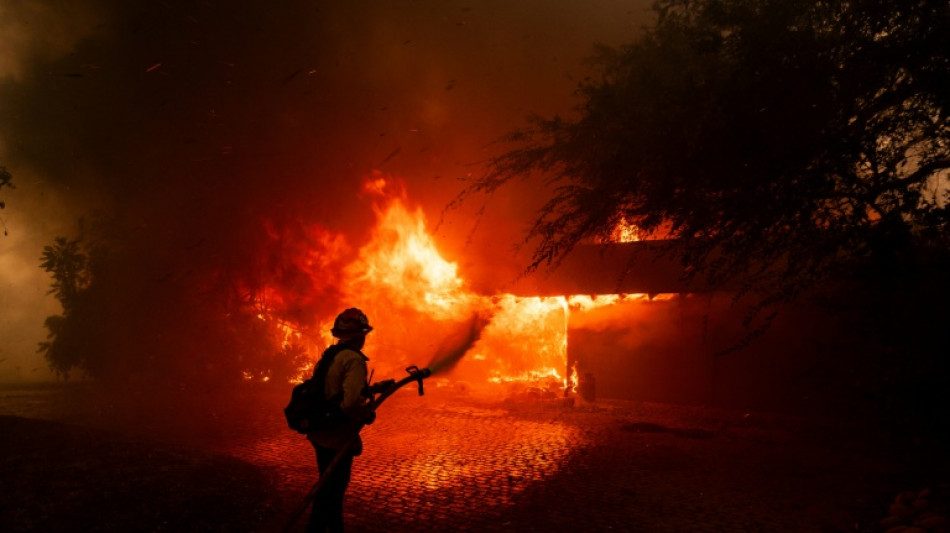
Thousands told to flee wildfire near Los Angeles

Thousands of people were urged to flee an out-of-control wildfire burning around communities near Los Angeles on Thursday, with dozens of homes already lost to the fast-moving flames.
Fierce seasonal winds were casting embers up to three miles (five kilometers) from the seat of the fire around Camarillo, with new blazes getting established on hillsides, farmland and in residential areas.
The Mountain Fire grew rapidly from a standing start early Wednesday, and after 24 hours had consumed almost 20,000 acres (8,100 hectares), with towering flames leaping unpredictably and sending residents scrambling.
"We've been up all night watching this. I haven't slept," Erica Preciado told one local broadcaster as she drove her family out of the danger zone.
"We're just trying to get a safe place. I didn't even know what to take. I just have everything in my car," she said, gesturing tearfully to her packed vehicle.
A number of houses have been destroyed, some consumed by the flames in a matter of minutes.
One man told broadcaster KTLA he and his family had fled their home of 27 years, finding out later that it had been destroyed.
"It's all gone," he said, his voice catching. "It's all gone."
Ventura County Fire Department officials said they were throwing resources at the blaze.
That included crews on the ground defending homes with hose lines working alongside bulldozers that were trying to remove fuels.
Helicopter pilots worked throughout the night dropping water, said Ventura County fire captain Trevor Johnson, predicting that the fight would continue for some time.
"We're going to have an active presence in there for days to come," he told reporters.
Hoses ran dry for crews battling the flames at one point late Wednesday, Ventura County Fire Chief Dustin Gardner said.
He said hundreds of fire trucks had been pumping water all night, putting a strain on resources.
"We have been fighting fire actively now for 26 hours, and we found all of those fire trucks hooked up to all of those hydrants, and we drained water systems down," he told reporters.
That affected supplies higher up hillsides, and forced crews to shuttle water up to the blazes.
He said while it was not a common problem, it is known to happen in major incidents.
"It's normal enough that we plan for it, so it's impactful, but it will be mitigated," he said.
- 'Diminish' -
Damage assessment teams were making their way through areas where the fire had burned in a bid to understand how many properties had been affected.
Emergency managers said they did not know how many homes had been lost, but news crews on the ground found dozens in flames or utterly destroyed, with some estimates as high as 100.
The cause of the fire was not immediately known, but meteorologists had raised a Red Flag Warning in the area, indicating dangerous fire conditions.
They said two years of above-average rainfall had sparked abundant growth of vegetation, which was now all bone-dry after a long, hot summer.
Seasonal Santa Ana winds from California's desert interior had brought gusts at one point as high as 80 miles (130 kilometers) an hour, making firefighting conditions exceedingly difficult.
Rich Thompson of the National Weather Service said those winds had eased slightly on Thursday, and were expected to drop considerably by the evening.
"We expect Santa Ana winds gusting from the northeast at about 25 to 35 miles per hour through the afternoon hours, along with humidity dropping down to around 10 to 15 percent," he said.
"Fortunately, by mid-late afternoon, we expect those Santa Ana winds to diminish in strength."
Electricity companies had cut power to tens of thousands of customers in the area -- a common strategy in California during high winds in a bid to reduce the risk of new fires from toppled power lines.
M.Jacobucci--PV
